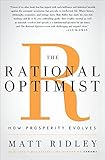Found in 2 comments on Hacker News
DanielBMarkham · 2012-01-24
· Original
thread
On the flip side, there's "The Rational Optimist" http://amzn.to/Al7nQB (affiliate link)
I hate to use cliches, but I think you can look at reality and argue it either way -- it's truly arbitrary, a "glass half-full" thing. I'd the nature of being able to argue it both ways only emphasizes the necessity of taking Kierkegaard's leap: the nature of the problem is truly about working with incomplete information.


"Can't imagine why they are one of the poorest countries on earth."
Agreed !
I would add this relevant idea by Matt Ridley from The Rational optimist (http://amzn.to/KvuK4S) :-
As long as human exchange and specialization are allowed to thrive somewhere, then culture evolves whether leaders help it or hinder it, and the result is that prosperity spreads,technology progresses, poverty declines, disease retreats, fertility falls, happiness increases, freedom grows, knowledge flourishes and the environment improves.